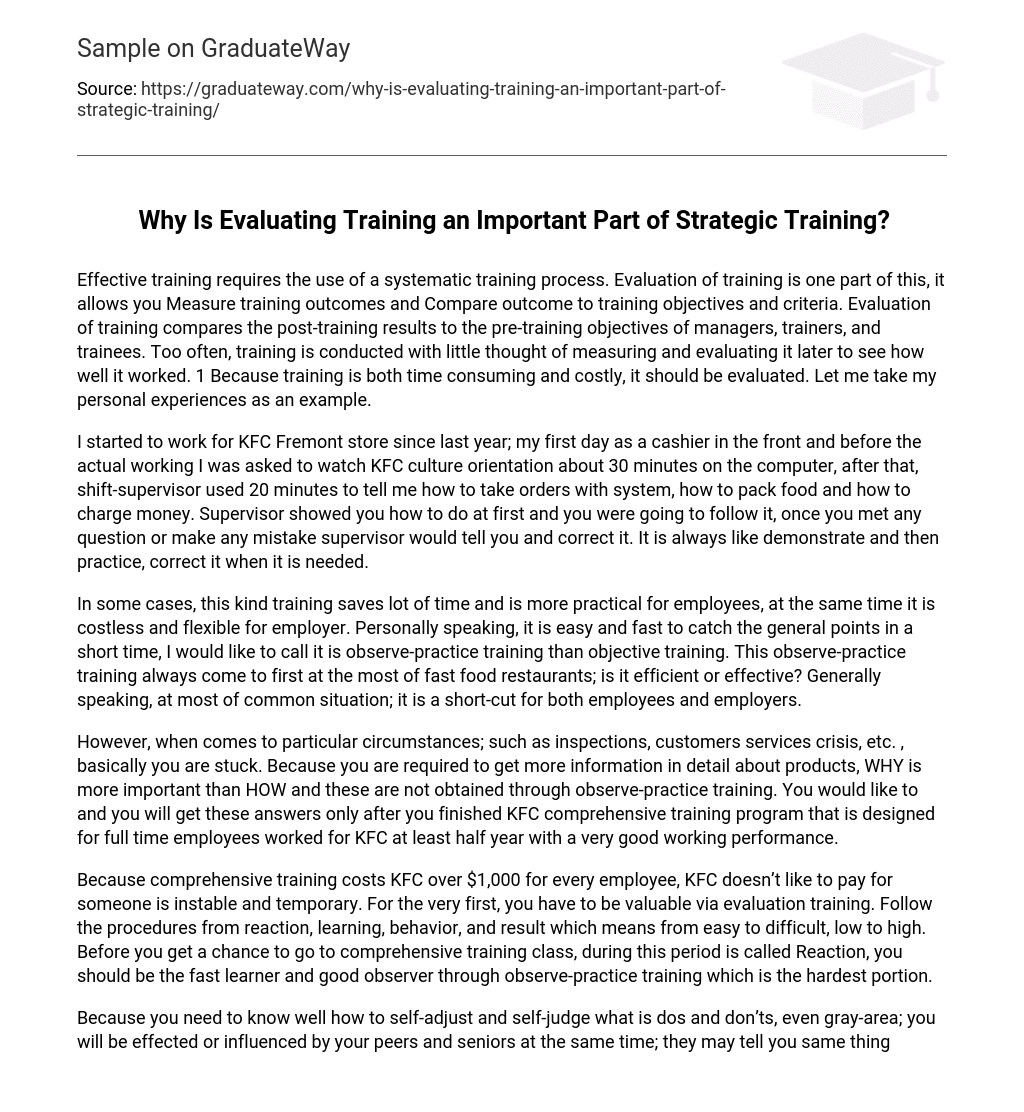Effective training requires the use of a systematic training process. Evaluation of training is one part of this, it allows you Measure training outcomes and Compare outcome to training objectives and criteria. Evaluation of training compares the post-training results to the pre-training objectives of managers, trainers, and trainees. Too often, training is conducted with little thought of measuring and evaluating it later to see how well it worked. 1 Because training is both time consuming and costly, it should be evaluated. Let me take my personal experiences as an example.
I started to work for KFC Fremont store since last year; my first day as a cashier in the front and before the actual working I was asked to watch KFC culture orientation about 30 minutes on the computer, after that, shift-supervisor used 20 minutes to tell me how to take orders with system, how to pack food and how to charge money. Supervisor showed you how to do at first and you were going to follow it, once you met any question or make any mistake supervisor would tell you and correct it. It is always like demonstrate and then practice, correct it when it is needed.
In some cases, this kind training saves lot of time and is more practical for employees, at the same time it is costless and flexible for employer. Personally speaking, it is easy and fast to catch the general points in a short time, I would like to call it is observe-practice training than objective training. This observe-practice training always come to first at the most of fast food restaurants; is it efficient or effective? Generally speaking, at most of common situation; it is a short-cut for both employees and employers.
However, when comes to particular circumstances; such as inspections, customers services crisis, etc. , basically you are stuck. Because you are required to get more information in detail about products, WHY is more important than HOW and these are not obtained through observe-practice training. You would like to and you will get these answers only after you finished KFC comprehensive training program that is designed for full time employees worked for KFC at least half year with a very good working performance.
Because comprehensive training costs KFC over $1,000 for every employee, KFC doesn’t like to pay for someone is instable and temporary. For the very first, you have to be valuable via evaluation training. Follow the procedures from reaction, learning, behavior, and result which means from easy to difficult, low to high. Before you get a chance to go to comprehensive training class, during this period is called Reaction, you should be the fast learner and good observer through observe-practice training which is the hardest portion.
Because you need to know well how to self-adjust and self-judge what is dos and don’ts, even gray-area; you will be effected or influenced by your peers and seniors at the same time; they may tell you same thing in different theories that really hard to tell which one is right or wrong; and you don’t want to upset any of them. After this, you may feel easy on next coming three levels: learning which is send you to the comprehensive training class explains every procedure in detail and you may understand not only How but more Why, and you should pass the final test to get certificates before you entre upper level.
Behavior which is you are going to put what have you learned into practice with nearly zero mistakes in your daily work. If you continually performance well and pass the interview with KFC district manager, you may get an opportunity to reach manager position in future job openings. In a nut shell, evaluating training is an employee talents shaping portion of strategic training that prepares the valuable employees for organizations and minimized turnover at the same time. For your information, KFC Company provides comprehensive training in the following areas:
Leadership Development
– Coaching Skills
– Culture
– Interaction Management
– Fire Safety
– First Aid training
– Food Safety
– Human Resources, Workplace Health & Safety
– Information Systems
– Financial & Operations Accounting2
Work cited
1. page 260 Robert L. Mathis John H. Jackson Human Resource Management 13th Ed.2010
2.http://www.kfcqld.com.au/careers_training_philosophy





